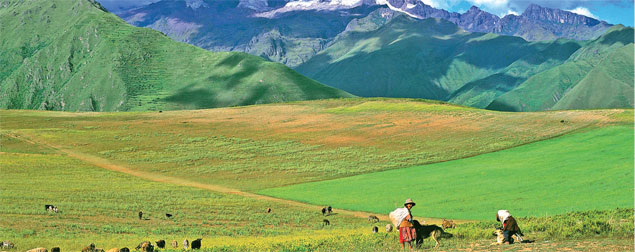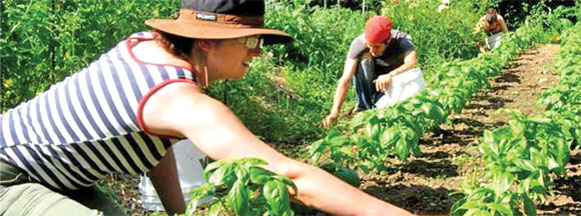ISO 26000 - A guiding standard for social responsibility
By Dr. Lalith Senaweera
 Social responsibility is one of the important areas that any country
has to take into consideration to ensure that organisations are
concerned not only with the products or services that they provide but
also consider the impact on the environment and carry out the work in a
socially accepted manner. Social responsibility is one of the important areas that any country
has to take into consideration to ensure that organisations are
concerned not only with the products or services that they provide but
also consider the impact on the environment and carry out the work in a
socially accepted manner.
In this regard the International Organization for Standardisation
(ISO) has set up a technical committee comprising experts to prepare a
standard covering best practices in this area. The committee considered
developing a guide covering seven core values: * Human Rights, * Labour
Practices, * The Environment, * Fair Operating Practices, * Consumer
Issues, * Community Involvement and Development and * Organisation
Governance.
The international standard ISO 26000, guidance on social
responsibility, provides harmonised, globally relevant guidance for
private and public sector organisations of all types based on
international consensus among expert representatives of the main
stakeholder groups, and encourages the implementation of best practices
in social responsibility worldwide.
What is ISO 26000?
ISO 26000 adds value to existing work on Social Responsibility (SR)
and extends the understanding and implementation of SR by: Developing an
international consensus on what SR means and the SR issues that
organisation need to address, Providing guidance on translating
principles into effective actions, Refining best practices that have
already evolved and disseminating that information worldwide for the
good of the international community.
ISO 26000 is an ISO international standard giving guidance on SR. It
is intended for use by organisations of all types, in the public and
private sectors, in developed and developing countries, and in economies
in a responsible manner that society increasingly demands.
ISO 26000 contains voluntary guidance, not requirements, and,
therefore, is not for use as a certification standard like ISO 9001;2008
and ISO 14001:2004.
The importance of ISO 26000
Sustainable business for organisations means not only providing
products and services that satisfy the customer, and doing so without
jeopardising the environment, but also operating in a socially
responsible manner.
 Pressure comes from customers, consumers, governments, associations
and the public at large. At the same time, far-sighted organisational
leaders recognise that lasting success must be built on credible
business practices and the prevention of such activities as fraudulent
accounting and labour exploitation. Pressure comes from customers, consumers, governments, associations
and the public at large. At the same time, far-sighted organisational
leaders recognise that lasting success must be built on credible
business practices and the prevention of such activities as fraudulent
accounting and labour exploitation.
The challenge is the manner of including the principles into practice
and implementing SR effectively and efficiently when even the
understanding of what 'social responsibility' means may vary from one
program to another.
In addition, previous initiatives have tended to focus on 'corporate
social responsibility', while ISO 26000 will provide SR guidance not
only for business organisations, but also for various types of public
sector organisations.
The membership of the ISO and WG SR was the largest and most
broadbased in terms of stakeholder representation to develop ISO
standard. Six main stakeholder groups were represented: industry,
government, labour, consumers, Non-Governmental Organisations: service,
support, research and others and a geographical and gender-based balance
of participants.
Under the joint leadership of the ISO member for Brazil (ABNT) and
Sweden (SIS), it was made up of experts from ISO member (National
Standard Bodies - NSBs) and from liaison organisations, associations,
representative business, consumers or labour, or inter-governmental or
inter-government or Non-Governmental Organisations) membership was
limited to a maximum of six experts per NSB and two experts per liaison
organisation.
ISO's expertise is in developing harmonised international agreements
based on double levels of consensus among the principal categories of
stakeholders and among countries (ISO) is a network of the national
standards bodies of 163 countries.
 ISO 26000 instills a globally relevant understanding of what social
responsibility is and what organisations need to do to operate in a
socially responsible way. ISO 26000 instills a globally relevant understanding of what social
responsibility is and what organisations need to do to operate in a
socially responsible way.
ISO 26000 and organisations
ISO 26000 will help all types of organisations - regardless of their
size, activity or location - to operate in a socially responsible manner
by providing guidance on: Concepts, terms and definitions related to
social responsibility, Background, trends and characteristics of social
responsibility, Principles and practices relating social responsibility,
Core subjects and issues of social responsibility, Integrating,
implementing and promoting socially responsible behaviour throughout the
organisation and, through its policies and practices, within its sphere
of influence, Identification and engaging with stakeholders,
Communicating commitments, performance and other information related to
social responsibility.
The guidance in ISO 26000 draws on best practices developed by public
and private sector SR initiatives. It is consistent with and complements
relevant declarations and conventions by the United Nations and its
constituents notably the International Labour Organization (ILO), with
which ISO has signed a Memorandum of Understanding (MoU) to ensure
consistency with ILO Labour Standards.
ISO has also signed MoUs with the United Nations Global Compact
Office (UNGCO) and with the Organization for Economic co-operation and
Development (OECD) to enhance their cooperation on the development of
ISO 26000. ISO 26000 will integrate international expertise on social
responsibility - what it means, what issues an organisation needs to
address to operate in a socially responsible manner, and what is best
practice in implementing SR.
ISO 26000 will be a powerful SR tool in assisting organisations to
move from good intentions to good actions.
The writer is the Director General of the Sri Lanka Standards
Institution. |

